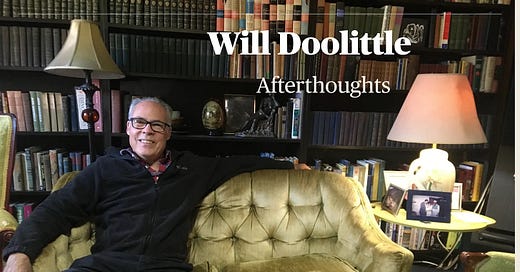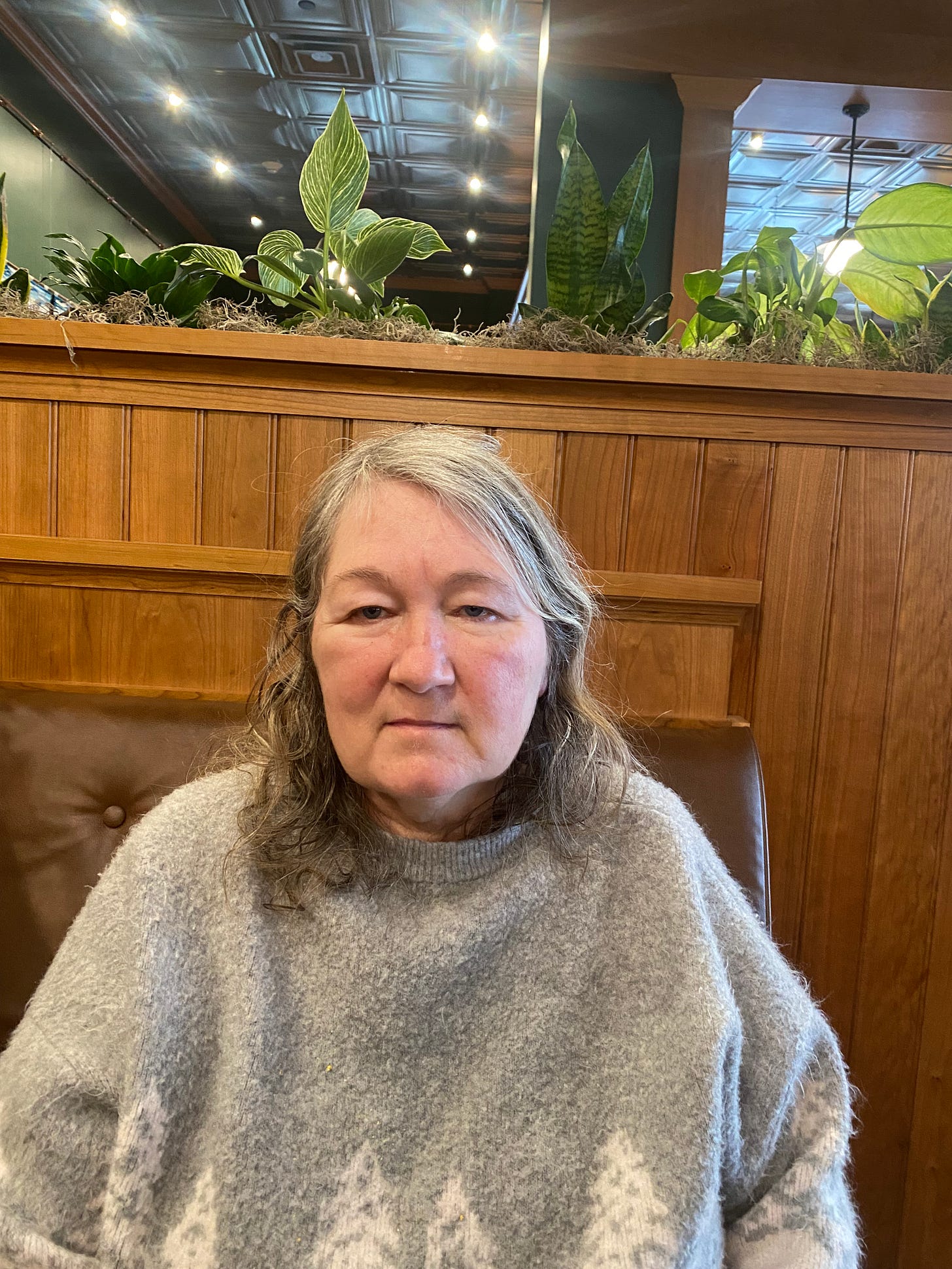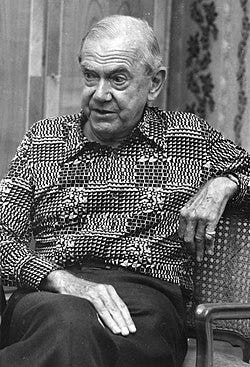Alzheimer's strips us of everything
Graham Greene, master of despair
Please consider supporting The Front Page with a paid subscription: HERE
Bella has started taking her clothes off when I leave her alone downstairs in the middle of the day.
I’ll go down to see how she’s doing and find her walking from one room to another, naked. It happened early this past week.
“Did you come to save me?” she said.
“Yes. Do you want to put your clothes back on?” I said.
“Yes,” she said.
She looks at me unabashed when I find her like that, her eyes as calm and empty as the sky.
I never see her eyes gleaming with anger or amusement anymore. They’re as dull as stones, usually. Occasionally, they glimmer a little.
“You’re so cute,” she says.
“So are you,” I say and give her a kiss.
We don’t talk much. Sometimes, she seems about to say something I would probably want to hear, but she can’t find the words.
The worse the Alzheimer’s symptoms get, the less she understands what is happening.
“I’m sick,” she said to me desperately about a month ago.
“I know,” I said, embracing her. “I know.”
She seems to be suffering, or grieving, much of the time. She leans forward in her chair, elbows on her knees, hair hanging in her face. She doesn’t answer when I speak to her.
She stops while walking through a room, bent forward, staring at the floor, unsure how to proceed.
She dozes, in and out, for hours during the day. She gets up during the night and wanders the downstairs, trying the doors, which I’ve locked.
“I’m sorry, I’m sorry,” she said early in the morning last Sunday, as I got her back into her clothes and into bed and covered up.
“You’re fine, Sweetie,” I said.
I went into the dining room and looked down and realized why she was apologizing. I cleaned up the mess with soap and hot water and paper towels. I took up the entrance mat from the front hallway and threw it onto the back porch with the trash. I sprayed Nature’s Miracle pet odor and stain remover on the dining room rug. I lit a candle and put it on the table.
I brought her into the bathroom for a shower as soon as she got up, then stripped the bed and threw the sheets and one of the blankets into the washer.
I cleaned the bottom of her feet with wet paper towels.
I have chosen this, I tell myself.
She cries sometimes in the morning while we’re sitting on the couch in the library.
I put my arms around her.
“What’s going on, Sweetie? What’s the matter?” I said Wednesday morning.
She can’t answer.
It’s good she sleeps so much.
“I think that’s the only time she’s happy,” our daughter Ginny said to me recently.
I have heard her talking tenderly in her sleep. I hope she still laughs and loves in dreams.
Not really funny
I read “The Comedians” by Graham Greene. Published in 1966, it falls in the last third of his very long writing career (he had novels published from 1929 to 1988) and is the 11th one of his books I’ve read, which, just on quantity, makes him one of my favorite authors. But in quality, too, I put his books near the top of my list. “Travels with My Aunt” (published 1969), with its stunning ending, is my favorite of his books (so far), but “The Comedians” might be second.
“The Comedians” is set in Haiti during the oppressive reign of Papa Doc Duvalier, whose personal army, the Ton Ton Macoutes, roamed the countryside, listening for whispers of discontent and torturing and killing the discontented. At the beginning of the book, a man named Brown is returning to Port-au-Prince by ferry to his hotel, once a popular nightspot but now, under Duvalier’s regime, all but abandoned.
Brown is the classic Greene protagonist — disreputable and mercenary but also honorable and brave in almost equal measure. He’s like Rick Blaine from “Casablanca” but without Bogart’s charisma. Greene’s heroes don’t think much of themselves or other people or the world in general. They are burnt-out cases, so much so that Greene titled his 1960 novel about a famous architect who leaves his career to volunteer in a leper colony in the Congo “A Burnt-Out Case.” Aunt Augusta, the titular character of “Travels with My Aunt,” doesn’t fit this mold, which may be why I like that book best.
Brown seems to get a little bit hopeful as “The Comedians” nears its end — “happy” would be an overstatement — and, although much of the novel is grim, I closed it with a smile. Other Greene novels I’ve closed while shaking my head at the depth of his disillusionment with humanity. Admirable and likable people can be hard to find in his books.
A convert to Catholicism, Greene seems to be trying, unsuccessfully, to work out his ambivalence toward his faith in several of his books: “Brighton Rock,” “The Power and the Glory,” “The Heart of the Matter” and “The End of the Affair,” especially. Thankfully, “The Comedians” is not saddled with religiosity. Greene traveled extensively to war-torn and abysmal places — he spent time in Duvalier’s Haiti — and his stories are noticeably empty of Catholic virtues like grace and mercy but full of other qualities, like cruelty and despair. Perhaps the search for something fine in the most wretched and unlikely circumstances is the point.
Poetry
Here is a poem by poet Richard Carella of Hudson Falls:
Man Walking
There were smells in the night air as welcome to him as friends
he hadn’t seen in years–
scents he’d half-forgotten that seemed to lie in-wait for him;
(or so he couldn’t help imagining,
as he drew nearer to their source); although,
not as with a mind to draw him back...
but more: as if to bring him to himself.
No drag queen again
The musical “Drag Queen Story Hour,” written by Neal Herr and planned for performances at the Wood Theater in June, has been called off because of difficulties in casting the show.
Getting people to commit to a time-consuming project like a full-length musical is a challenge, but Herr said he also ran into reluctance among would-be performers to risk negative attention of the sort that plagued Rockwell Falls Public Library in Lake Luzerne two years ago when it scheduled a story hour with drag performer Scarlet Sagamore.
The uproar in Lake Luzerne, led by a pastor, Josh Jacquard, who is now on the library’s board, resulted in resignations of board members and the library’s director and closure of the library for about five months. It also inspired Herr to write his musical.
“Whenever I ask someone if they want to be involved, they’re having to assess the social risk. It’s this whole calculation,” he said.
Chuck Copenspire, a local entrepreneur and trans man who was going to be in the show, said he worried about protests from the same people who shut down Rockwell Falls library. Also, the country has become a less friendly place for trans Americans over the past year or so, he said.
“It’s kind of in the air. It feels less safe to be a trans person,” he said.
Copenspire lives in Glens Falls with his partner and two children and runs a marketing business, Identity Pending. The family moved here three years ago from Portland, Oregon, and they’ve been welcomed in Glens Falls, he said.
“I’ve not experienced any hate in Glens Falls. People are curious and ask questions that might technically be inappropriate, but everyone’s been very kind and not disrespectful,” he said.
He is in touch online with people from the trans community who have retreated from having a public presence, because of the animosity they see in the country, he said.
“Lots of people have gone stealth, deleted their online presence,” he said.
Copenspire isn’t hiding his identity, but — “I definitely 100 percent considered shutting down everything to keep myself and my family safe,” he said.
He will be holding a grand opening of his business soon at a new location in the Shirt Factory Annex.







Your willingness to write so honestly and eloquently about caregiving is a gift. Thank you.
“If you want others to be happy, practice compassion. If you want to be happy, practice compassion.”- Dalai Lama
💕